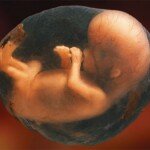 Hong Kong researchers have reported the first attempt to perform large-scale genetic analysis of an unborn child from the blood of its mother. The technique takes advantage of the fact that foetal DNA is found in small quantities in maternal blood; however, analysing this DNA is complicated by the fact that it is heavily contaminated by DNA from the mother (in a ratio of around 9:1). This means that while it is possible to identify the fraction of the foetus’ genome derived from the father, determining whether or not a specific variant has been inherited from the mother is extremely challenging.
Hong Kong researchers have reported the first attempt to perform large-scale genetic analysis of an unborn child from the blood of its mother. The technique takes advantage of the fact that foetal DNA is found in small quantities in maternal blood; however, analysing this DNA is complicated by the fact that it is heavily contaminated by DNA from the mother (in a ratio of around 9:1). This means that while it is possible to identify the fraction of the foetus’ genome derived from the father, determining whether or not a specific variant has been inherited from the mother is extremely challenging.
Contrary to some media reports, the researchers didn’t succeed in (or attempt) sequencing of the foetus’ entire genome. Rather, they genotyped the parents at ~900,000 sites of common variation, and then estimated the foetus’ genotype at a fraction of those sites using next-generation sequencing of DNA extracted from the mother’s blood. Truly comprehensive analysis of the foetal genome would first require high-accuracy genome sequences of both parents, as well as extremely deep (and thus expensive) sequencing of maternal blood DNA. It seems likely thatin the immediate future foetal DNA analysis will be restricted mostly to targeted examination of specific disease mutations (a far more tractable problem), providing non-invasive detection of severe disease mutations in early pregnancy for at-risk families. [DM]
Over at Genomics Law Report, Unzipper Dan Vorhaus uses revelations from the WikiLeaks cables about US plans to obtain DNA and other biometric data from key world leaders to explore the currently muddy laws around surreptitious DNA testing. [DM]
 There is a short letter in this week’s Nature from Alex Bateman and Darren Logan, the organisers of the Sanger Institute’s lunchtime Wikipedia sessions (as reported on by Nature News last month). They argue that Wikipedia is so widely used, and so influential in communicating science to the public, that scientists have a duty to their field to ensure that the articles are clearly and accurately communcating their research.
There is a short letter in this week’s Nature from Alex Bateman and Darren Logan, the organisers of the Sanger Institute’s lunchtime Wikipedia sessions (as reported on by Nature News last month). They argue that Wikipedia is so widely used, and so influential in communicating science to the public, that scientists have a duty to their field to ensure that the articles are clearly and accurately communcating their research.
Type any scientific term into any search engine and it is likely that a Wikipedia article will be the first hit. […] Wikipedia is now the first port of call for people seeking information on subjects that include scientific topics. Like it or not, other scientists and the public are using it to get an overview of your specialist area.
If anyone is inspired by this plea, the wikipedia page on Heritability could use a little work…
The picture above is from a brilliant visualisation of science edits on wikipedia from the Places & Spaces exhibition. You can see it in much more detail here.[LJ]
[Image of foetus from Wikimedia Commons.]








 RSS
RSS Twitter
Twitter
0 Responses to “Friday Links”